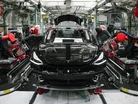Tesla is among leaders investing heavily in EV expansion

The development of batteries has become a crucial process in the making of electric vehicles (EVs).
According to Reuters, major EV industry players are expected to invest near US$1.2tn by the end of 2030 in a push to produce more cars and batteries, and find more reliable sources of materials.
The likes of Tesla, VW, and Google are among the companies that will invest heavily in EV technology. The automotive industry forecasted demand for around 54 million battery-electric vehicles in 2030 as teams push forward in switching their fleets to all-electric.
Tesla is one of the leading players in this as it expands its battery capabilities through its gigafactories as part of its ambitious plan to supply 20 million of the cars required in the industry, and roughly three terawatt-hours of batteries. This is a major jump in output from this year’s forecast—1.5 million EVs, which will cost the firm hundreds of billions of dollars.
As mentioned, Tesla is not the only contributor to this mass expansion of the EV market. German carmakers have roles to play in this with Mercedes-Benz setting aside US$47bn for EV innovation and manufacturing, amounting to around 200 gigawatt-hours.
Meanwhile, BMW plans a similar spend to that of Stellantis and General Motors (GMs), which all plan to invest US$35bn in electrification. Stellantis is planning a rigorous battery development programme, which will result in 400GWh capacity by 2030 across its North American plants.
From Japan, Toyota Motor Group will invest US$70bn in electrification to facilitate the production and sale of 3.5 million EVs in 2030, by expanding its range to incorporate 30 different models of battery-electric vehicles (BEVs) and transitioning its entire Lexus brand.
Tesla Cybertruck reaps benefits of in-house battery production
Yet to be delivered to the automotive market, the Tesla Cybertruck will leverage the expansion of its battery manufacturing unit at the Gigafactory. The company’s 4680 battery cells are expected to provide major cost savings and significant increase in power for each of Tesla’s vehicles.
The output of the 4680 cells is growing exponentially and more interest is growing in the use of the battery cells for the Tesla Semi truck, which is expected to be delivered as early as December.
“It is worth emphasising that we have enough 2170 cells to satisfy all vehicle production for the remainder of the year. So we’re not dependent on 4680. 4680 will be important next year, but it is not important for this year,” says Elon Musk, Founder and CEO of Tesla.


